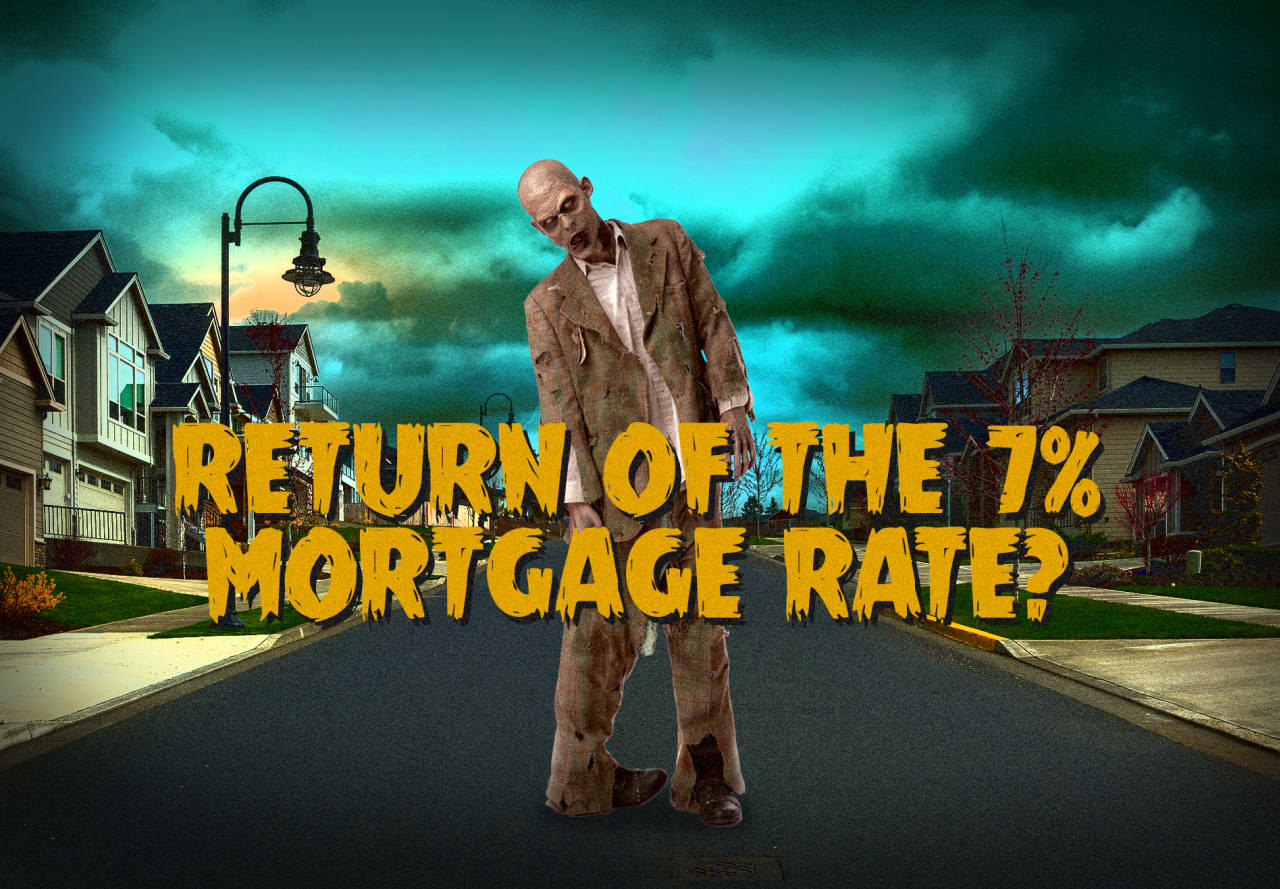7% mortgage rates are back. But don’t be afraid. Interest rates will fall in 2024, economists say.

With high prices and low inventory, the U.S. housing market can sometimes feel like a horror movie for prospective homebuyers. Now there are fears that a villain has returned from the dead. That’s a 7% mortgage interest rate.
After mortgage rates surged in March 2022, the 30-year rate reached 8% in October 2023 as the Federal Reserve embarked on a series of rate hikes to quell inflation.
Mortgage interest rates began to fall again in December last year and fell below 7% for the first time in four months. Forecasters suggest the 7% interest rate is dead, predicting that interest rates will fall below 6% by the end of 2024, but 7% interest rates may still have some life in them. U.S. economic growth is still progressing at a faster pace than expected, which is causing overall and mortgage rates to continue to rise.
But don’t be afraid. Interest rates will still fall later this year, economists told MarketWatch.
Mortgage rates rose last week after data showed consumer and wholesale prices rose last month and the job market strengthened. Mortgage rates are rising across the board once again as the Federal Reserve is expected to delay rate cuts until the second half of the year.
According to some sources, 30 years is already over 7%.
Mortgage lenders set interest rates based on a variety of factors, including the borrower’s credit score, loan-to-value ratio, and other market factors. This causes significant fluctuations. As of Friday afternoon, the 30-year mortgage rate had risen to 7.14%, according to a survey by Mortgage News Daily.
Freddie Mac, which makes estimates based on thousands of mortgage applications, said rates rose 13 basis points to 6.77% on February 15. And the Mortgage Bankers Association, which provides data a week later, found that the average contract rate for 30-year mortgages was 6.87% last week, while 30-year jumbo loans had already reached 7%.
“What’s happening now is that there have been some really strong data releases that people are paying close attention to, including the CPI itself, and they’re concluding that the Fed is going to change the pace or timing at which it cuts interest rates. Doug Duncan, chief economist at Fannie Mae, said in a phone interview with MarketWatch on Friday.
“There is uncertainty in the market. “But they are also ignoring the fact that consumer spending has shown to be very weak and several other macro indicators have shown to be even weaker,” he added. Retail sales in January fell to their lowest in 10 months, and credit card and auto loan delinquency rates hit their highest in more than a decade. Consumer credit growth has slowed significantly.
The Intercontinental Exchange, which tracks mortgage rates, said the 30-year rate rose to 6.87% in the past few days. However, Andy Walden, ICE’s vice president of corporate research and strategy, told MarketWatch: “Borrowers with lower credit scores, borrowers doing cash-out refinances, and jumbo loan borrowers are all averaging more than 7 percent.”
“The reason interest rates are rising is as simple as market expectations meeting the reality of recent economic reports,” Walden explained.
He added that strong economic data that beat market expectations “created market uncertainty about the possibility of the Federal Reserve easing interest rates early this year.”
Other Factors That Can Increase Mortgage Interest Rates
Lawrence Yun, chief economist at the National Association of Realtors, told MarketWatch that two other factors also remain in the dark.
Chief Yoon said, “We are issuing large amounts of government bonds to cover the large federal budget deficit.” “It’s outside the Fed’s control, but absorbing those amounts means there’s a need to provide higher interest rates.”
And we shouldn’t forget the possibility of a government shutdown in March, he added. “And there could also be disruptions in government bond payments.”
But the 30-year rate of return measured by Freddie Mac is “unlikely to go up to 7%,” Yoon said. “We will likely see weekly bounce rates, but we think the average rate will be closer to 6% by the end of the year.”
Fannie Mae said interest rates would go back below 6%.
The return of high mortgage rates is a headache for the real estate industry. That’s because sales are likely to slow even during the spring home buying season.
Home sales in 2023 hit a 29-year low amid historically unaffordable conditions. There were few homes for sale on the market and buyers were dealing with 8% mortgage rates. According to Redfin, the price of a typical home in the U.S. was about $402,300.
One agent pointed out that the current data is surprising people.
“Many of our clients are paying close attention to what the Federal Reserve says,” Hal Bennett, a Bellevue, Wash., real estate agent with Redfin Premier, said in a statement.
“Buyers and sellers sat on the sidelines in December when the Federal Reserve signaled it would cut interest rates three times next year, but some are now growing aloof as the Fed indicated the rate cuts may come later than expected.” added.
Duncan and his team at Fannie Mae said they still stand by their forecast that expects 30-year rates to fall below 6% by the end of the year. “I don’t think there’s any reason to change that forecast right now,” Duncan said. Rising interest rates are “the market’s response to short-term factors,” he added.
He also encouraged homebuyers to shop around for lower prices. “Lenders don’t make money if they don’t lend,” Duncan said. “So you have to go in the door knowing they are going to give you a loan, and if you let them compete you will get a better deal than if you just go with one.”
He added, “I do it myself.” “I have never gotten a mortgage without talking to at least three mortgage lenders, and I have gotten a better deal every time.”



